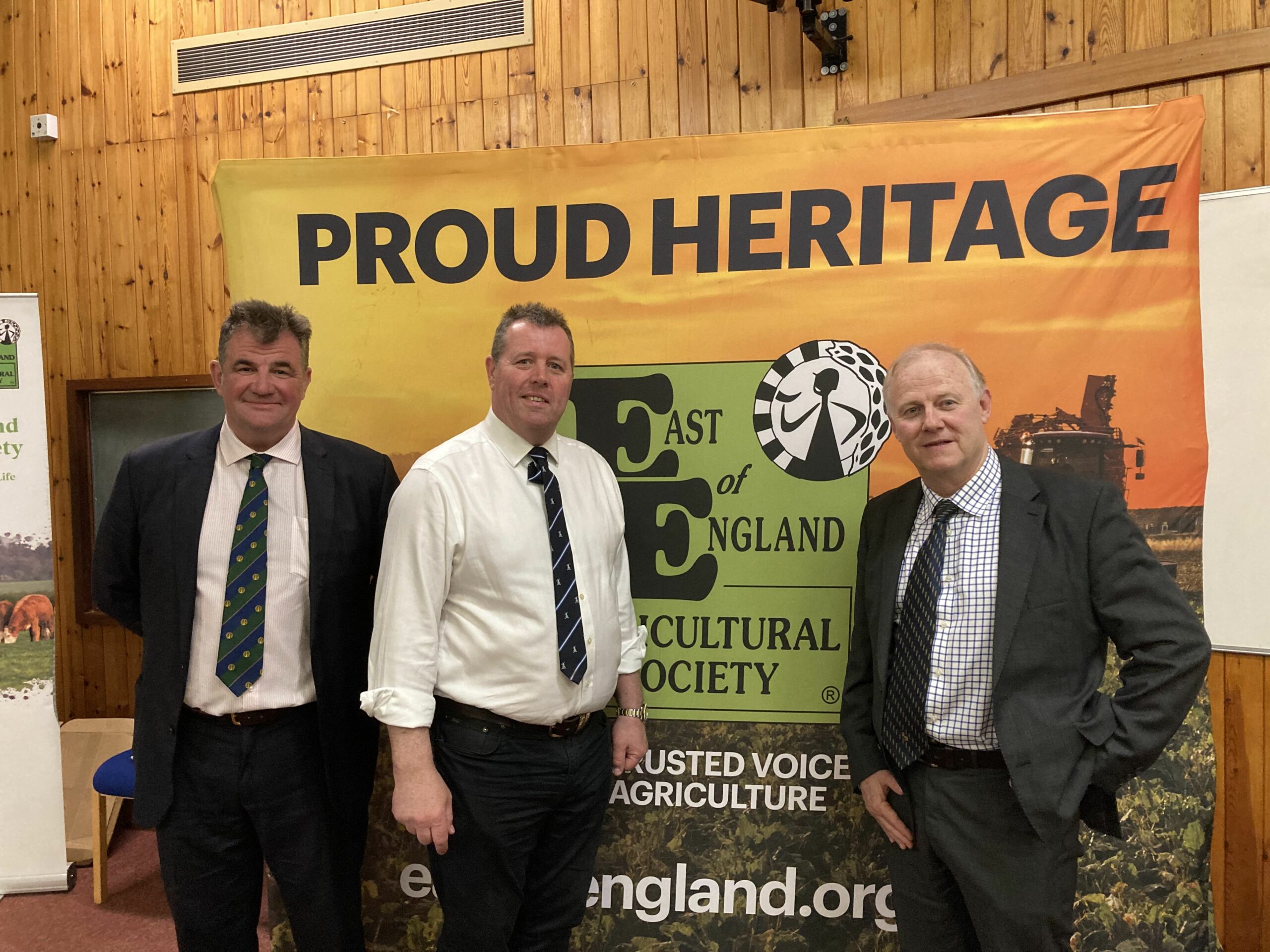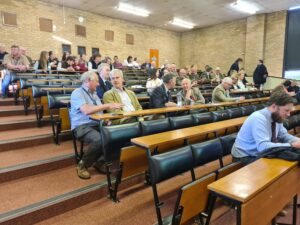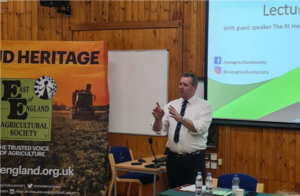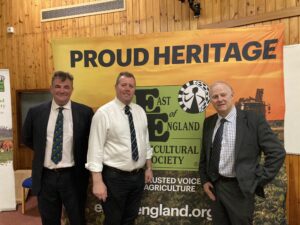
Innovation and championing our high-quality produce is the future of British farming, Mark Spencer MP tells Shuttleworth Lecture
Speaking to an audience of over 60 farmers, students, agricultural advisors and food producers, The Rt Hon. Mark Spencer MP, DEFRA Minister for Food, Farming and Fisheries, said that the future of British agriculture looks bright, with leading technology, a new focus on prioritising food security, and producing the highest quality food in the world really spearheading growth in the British agricultural sector in a manner not dissimilar to the post-war effort.
The Shuttleworth Lecture on Thursday 11th May, organised by the East of England Agricultural Society, welcomed Mark Spencer MP, a Shuttleworth College alumnus, back to his old stomping ground for an hour and a half of frank discussions about the future of the sector, with challenging questions from the floor leading to a really engaging session. Mr Spencer was welcomed by East of England Agricultural Society chairman, Charlie Reynolds, whilst the Q & A session was hosted by Phil Jarvis, Chair of Albanwise Farming and Environment.
“It isn’t always people but events that drive innovation in agriculture,” began Mr Spencer. “World War II drove huge innovation with the government solely focused on winning the war, which included feeding the nation. This policy led us to feeding the whole of Europe, which we did quite successfully for 80 years. The government at the time was focused wholly and laser-like on the need to feed, and I wonder what historians will look back on and think for 2022/23, will we take on the challenges that we face in the same way? With the challenges coming out of the pandemic, the war in Ukraine and the need to challenge the climate crisis, we are the holders of the baton in our sector.”
Mr Spencer continued: “This isn’t an easy challenge as many of the best solutions to each of those three challenges to food security are diametrically opposed. But we believe in government that we have four key tools in the box – Countryside Stewardship Scheme, Sustainable Farming Incentive, Capital Grants and landscape recovery. We also have the highest quality Beef and Lamb in the world, and that’s something we really need to get better at shouting about.”
 With horticultural producers in the audience, Mr Spencer was asked to address rebalancing the power dynamic between growers, producers and the retailers. “Retailers may well say they want year-round British supply of cucumbers for example, and the end customer values that British quality too, but we need to work on making both retailers and consumers understand that quality comes at a premium price.” With a food summit scheduled in Number 10 for next week to thrash out future support for food production, Mr Spencer was confident that this would be a huge step in moving forward with food production and food security as a priority, doing something to help assuage concerns about the lack of clarity on the future of ELMS and as one tenant farmer asked: “When are British farmers going to start being incentivised to grow food, has the last few years taught government nothing?”
With horticultural producers in the audience, Mr Spencer was asked to address rebalancing the power dynamic between growers, producers and the retailers. “Retailers may well say they want year-round British supply of cucumbers for example, and the end customer values that British quality too, but we need to work on making both retailers and consumers understand that quality comes at a premium price.” With a food summit scheduled in Number 10 for next week to thrash out future support for food production, Mr Spencer was confident that this would be a huge step in moving forward with food production and food security as a priority, doing something to help assuage concerns about the lack of clarity on the future of ELMS and as one tenant farmer asked: “When are British farmers going to start being incentivised to grow food, has the last few years taught government nothing?”
With advancements in GE sugar beet seed the focus of one question, Mr Spencer said: “We need to get better at communicating that moves in science can be good for us, and I think that’s one lesson we have all taken from the development and rollout of the Covid-19 vaccination.”
Mr Spencer also encouraged the sector to take back some responsibility for marketing the strength of our produce to their communities. “As a sector we have devolved communication of what we do to a third party, we were so busy as a sector growing food post-war that we didn’t do it ourselves, we trusted the retailers. But we can all do our bit as a sector. We have to try and improve our image as a sector, going to primary schools and talking to kids, going to Rotary Club meetings and more. Consumers do want to engage if you try. We’ve got to explain to people why we do the thing we do and that includes on social media too. If you see a post in your local Facebook group complaining about the smell of manure spreading, why not respond in an informative way just why you are spreading organic manure, to reduce reliance on chemical fertiliser, etc. There is a lot of misunderstanding of the sector, and we can do a lot to address that.”
Amelia Rome, East of England Agricultural Society member, Cambridgeshire farmer, and Farm Business Consultant, said: “I am reassured to hear of the food summit next week and also accept that there should be a price premium for British products, we’re really good at it and kids are really interested in how we grow it, but when it comes to price on the shelf the price-challenged consumer doesn’t care. We need to meet challenges of climate change and feeding the population, but we need good infrastructure to do that, and as arable farmers there aren’t any grants for what would be useful to me, a new grain store so I have some control on when I market the grain we are producing. I don’t want handouts; I want your help to get the competitive edge in a commodity-led industry.”
Mr Spencer confirmed that even with the winding down of the Basic Payment Scheme, the government is committed to continuing to spend an annual budget of £2.4billion on agriculture, with more options for the SFI on the table.
Charlie Reynolds, Chairman of the East of England Agricultural Society, said: “We would like to thank The Rt Hon Mark Spencer MP for joining us as guest speaker at this year’s Shuttleworth Lecture; it is always a really well-attended event and one that is important to us an Agricultural Society, giving a platform to farmers and food producers in the East of England with the DEFRA Minister for Food, Farming and Fisheries. I thank all of those who challenged the Minister with some strong and important questions, and for the frank responses that Mr Spencer duly gave.”
-ends-
All photos credit East of England Agricultural Society.
The East of England Agricultural Society has been at the forefront of championing agriculture and livestock for three centuries. With a rich history that dates back to 1797, the merger of five local agricultural Societies in 1970 saw the creation of the East of England Agricultural Society that we know today.
For further press information please contact Amy Woolliscroft on 07858 656444 or email amy@artheyassociates.co.uk.
For more information about the East of England Agricultural Society please visit our website www.eastofengland.org.uk.




